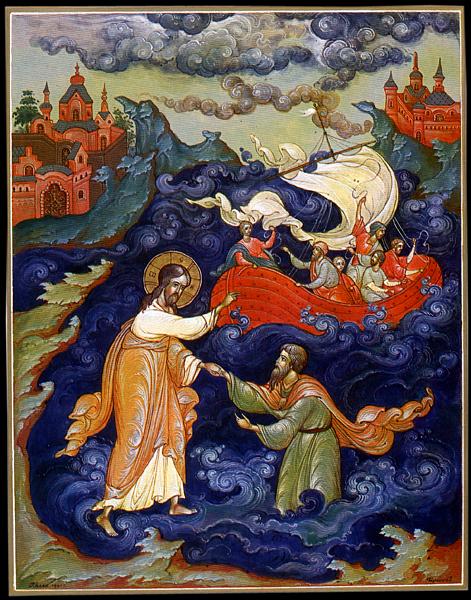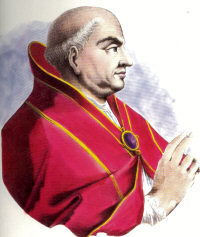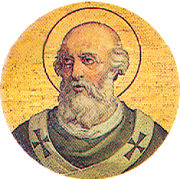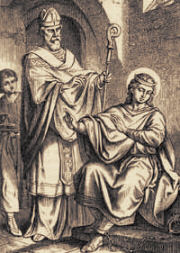16. And when even was now come, his disciples went down to the sea,
17. And entered into a ship, and went over the sea toward Capernaum. And it was now dark, and Jesus was not come to them.
18. And the sea arose by reason of a great wind that blew.
19. So when they had rowed about five and twenty or thirty furlongs, they see Jesus walking on the sea, and drawing nigh to the ship: and they were afraid.
20. But he said to them, It is I; be not afraid.
21. Then they willingly received him into the ship: and immediately the ship was at the land whither they went.
AUG. The Evangelist now returns to explain why they went, and relate what happened to them while they were crossing the lake: And it was dark, he says, and Jesus was not come to them.
CHRYS. The mention of the time is not accidental, but meant to show the strength of their love. They did not make excuses, and say, It is evening now, and night is coming on, but in the warmth of their love went into the ship. And now many things alarm them: the time, And it was now dark; and the weather, as we read next, And the sea arose by reason of a great wind that blew; their distance from land, So when they had rowed about five and twenty or thirty furlongs.
BEDE. The way of speaking we use, when we are in doubt; about five and twenty, we say, or thirty.
CHRYS. And at last He appears quite unexpectedly: They see Jesus walking upon the sea, drawing nigh. He reappears after His retirement, teaching them what it is to be forsaken, and stirring them to greater love; His reappearance manifesting His power. They were disturbed, were afraid, it is said. Our Lord comforts them: But He said to them, It is I, be not afraid.
BEDE. He does not say, I am Jesus, but only I am. He trusts to their easily recognizing a c voice, which was so familiar to them, or, as is more probable, He shows that He was the same who said to Moses, I am that I am.
CHRYS. He appeared to them in this way, to show His power; for He immediately calmed the tempest: Then they wished to receive Him into tile ship; and immediately the ship was at the land, whither they went. So great was the calm, He did not even enter the ship, in order to work a greater miracle, and to show his Divinity more clearly.
THEOPHYL. Observe the three miracles here; the first, His walking on the sea; the second, His stilling the waves; the third, His putting them immediately on shore, which they were some distance off, when our Lord appeared.
CHRYS Jesus does not show Himself to the crowd walking on the sea, such a miracle being too much for them to hear. Nor even to the disciples did He show Himself long, but disappeared immediately.
AUG. Mark's account does not contradict this. He says indeed that our Lord told the disciples first to enter the ship, and go before Him over the sea, while He dismissed the crowds, and that when the crowd was dismissed, He went up alone into the mountain to pray: while John places His going up alone in the mountain first, and then says, And when even was now come, His disciples went down to the sea. But it is easy to see that John relates that as done afterwards by the disciples, which our Lord had ordered before His departure to the mountain.
CHRYS. Or take another explanation. This miracle seems to me to be a different one, from the one given in Matthew: for there they do not receive Him into the ship immediately, whereas here they do: and there the storm lasts for some time, whereas here as soon as He speaks, there is a calm. He often repeats the same miracle in order to impress it on men's minds.
AUG. There is a mystical meaning in our Lord's feeding the multitude, and ascending the mountain: for thus was it prophesied of Him, So shall the congregation of the people come about You: for their sake therefore lift up Yourself again: i.e. that the congregation of the people may come about You, lift up Yourself again. But why is it fled; for they could not have detained Him against His wild? This fleeing has a meaning; viz. that His flight is above our comprehension; just as, when you do not understand a thing, you see, It escapes me. He fled alone to the mountain, because He is ascended from above all heavens. But on His ascension aloft a storm came upon the disciples in the ship, i.e. the Church, and it became dark, the light, i.e. Jesus, having gone. As the end of the world draws nigh, error increases, iniquity abounds. Light again is love, according to John, He that hates his brother is in darkness. The waves and storms and winds then that agitate the ship, are the clamors of the evil speaking, and love waxing cold. Nevertheless the wind, and storm, and waves, and darkness were not able to stop, and sink the vessel; For be that endures to the end, the same shall be saved. As the number five has reference to the Law, the books of Moses being five, the number five and twenty, being made up of five pieces, has the same meaning. And this law was imperfect, before the Gospel came. Now the number of perfection is six, so therefore five is multiplied by six, which makes thirty: i.e. the law is fulfilled by the Gospel. To those then who fulfill the law Jesus comes treading on the waves, i.e. trampling under foot all the swellings of the world, all the loftiness of men: and yet such tribulations remain, that even they who believe on Jesus, fear lest they should be lost.
THEOPHYL. When either men or devils try to terrify us, let us hear Christ saying, It is I, be not afraid, i.e. I am ever near you, God unchangeable, immovable; let not any false fears destroy your faith in Me. Observe too our Lord did not come when the danger was beginning, but when it was ending. He suffers us to remain in the midst of dangers and tribulations, that we may be proved thereby, and flee for succor to Him Who is able to give us deliverance when we least expect it. When man's understanding can no longer help him, then the Divine deliverance comes. If we are willing also to receive Christ into the ship, i.e. to live in our hearts, we shall find ourselves immediately in the place, where we wish to be, i.e. heaven.
BEDE. This ship, however, does not carry an idle crew; they are all stout rowers; i.e. in the Church not the idle and effeminate, but the strenuous and persevering in good works, attain to the harbor of everlasting salvation.
Catena Aurea John 6




 The unfortunate victim of Constans' wrath was the virtuous Martin. Born in Todi of noble birth, he had served as nuncio to Constantinople under Pope Theodore, gaining experience in dealing with the Byzantine court and familiarizing himself with the Monothelite teachings so prevalent in the East. Without waiting for the necessary imperial mandate, Martin proceeded with his consecration on July 5, 649. This independent act so enraged the emperor that he refused to acknowledge Martin as the legitimate pope.
The unfortunate victim of Constans' wrath was the virtuous Martin. Born in Todi of noble birth, he had served as nuncio to Constantinople under Pope Theodore, gaining experience in dealing with the Byzantine court and familiarizing himself with the Monothelite teachings so prevalent in the East. Without waiting for the necessary imperial mandate, Martin proceeded with his consecration on July 5, 649. This independent act so enraged the emperor that he refused to acknowledge Martin as the legitimate pope.  Leovigild, Arian King of the Visigoths, had two sons, Hermenegild and Recared, who were reigning conjointly with him. All were Arians, but Hermenegild married a zealous Catholic, the daughter of Sigebert, King of France, and by her holy example was converted to the faith. His father, on hearing the news, denounced him as a traitor, and marched to seize his person. Hermenegild tried to rally the Catholics of Spain in his defense, but they were too weak to make any stand; and after a two years’ fruitless struggle, Hermenegild surrendered on the assurance of a free pardon. Once he was safely in the royal camp, the king had him loaded with fetters and cast into a foul dungeon at Seville.
Leovigild, Arian King of the Visigoths, had two sons, Hermenegild and Recared, who were reigning conjointly with him. All were Arians, but Hermenegild married a zealous Catholic, the daughter of Sigebert, King of France, and by her holy example was converted to the faith. His father, on hearing the news, denounced him as a traitor, and marched to seize his person. Hermenegild tried to rally the Catholics of Spain in his defense, but they were too weak to make any stand; and after a two years’ fruitless struggle, Hermenegild surrendered on the assurance of a free pardon. Once he was safely in the royal camp, the king had him loaded with fetters and cast into a foul dungeon at Seville. 